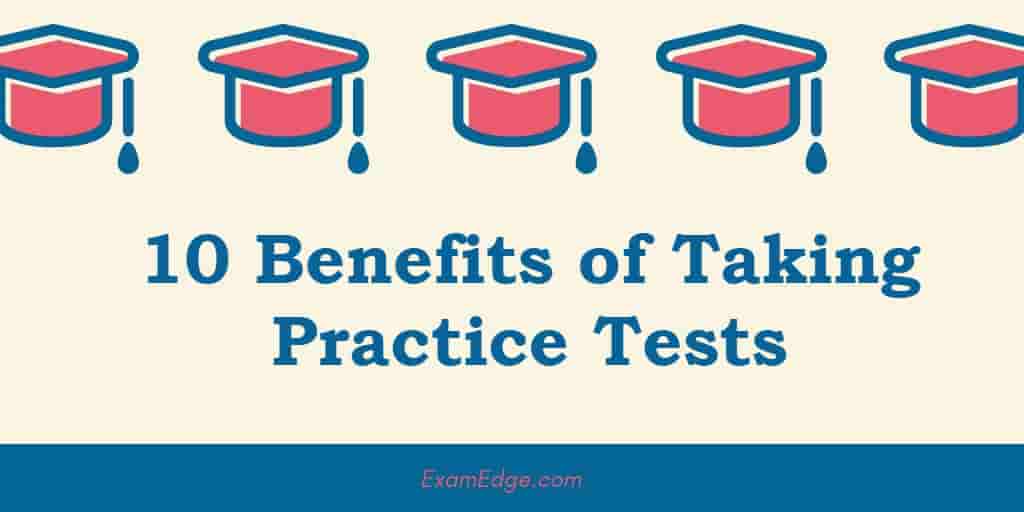10 Benefits of Taking Practice Tests
August-06-2018

They say practice makes perfect, and when you look to the habits of professional athletes, musicians and actors, it's easy to see why. Psychology writer Malcolm Gladwell once espoused the 10,000 hour rule: only after 10,000 hours of practice does a person become an expert in any field. While you may not need 10,000 hours of practice to get a high score on the SAT, there's no denying that completing practice tests can help you achieve better results. If you're prepping for an exam and are curious about the benefits of practice tests, take a look at these 10:
Build Stamina
Standardized tests often take multiple hours to complete. Given how predisposed our modern society tends to be with multitasking, sitting and staring at an exam hour after hour can be draining. Just as bodybuilders slowly work up to heavier weights over time, students should take practice tests to build their own exam-taking endurance. The first test or two may leave you exhausted, but the more you practice, the easier you'll find the idea of testing for hours on end.
Learn the Quirks of the Test
Tests are designed to identify what you know and what you don't. Unfortunately, though, they are rarely as straightforward as you'd hope they would be. Strategies for taking the SAT vary drastically from ACT test-taking strategies, which is why it helps to take practice tests. By repeatedly testing yourself, you grow accustomed to quirks in the design of the exam. Knowing the format inside out not only helps you become more comfortable with the process, it also helps you better prepare your own personal study strategies.
Identify Knowledge Gaps
It's difficult to know what you don't know. That's where practice tests come into play. You may think you'll breeze through the analogies portion of the exam, but if practice results reveal a less than stellar score, you can refocus your study efforts. Confidence is good, but the results of multiple practice tests can confirm that you're as knowledgeable as you think you are - or that you need to step up your studying game.
Alleviate Anxiety
In all likelihood, there's a lot riding on the results of your test. Perhaps you're working to get into the school of your dreams or hoping to achieve a new certification for your job. Regardless of your reasons for testing, tension is probably running high. One way to ensure maximum comfort and minimal anxiety is to practice. The more often you sit for a practice test, the more natural it will feel the day of the actual one. You'll have enough to think about on the big day. While it's normal to feel nervous about a high stakes exam, anxieties should be quelled the more practice tests you run.

Perfect Your Timing
Given the marathon-length test procedures, it's easy to lose track of time. The last thing you want, is to realize the exam is almost over when you're only halfway through a reading comprehension passage. Pacing is important when you have a limited time to complete a given section. Taking multiple practice tests can give you a better feel for how long you should be devoting to each portion. There's a lot of things out of your control on the day of the actual test and timing shouldn't be one of them.
Track Your Progress
You can't know where you're going until you know where you've been. Tracking your progress can be a great way to show you which study strategies are working for you and which should be abandoned. Even establishing a baseline through a single practice test can give you the intel needed to know what areas need your focus. Of course, the more data points, the fuller the picture. Take multiple practice tests and plot your results for a snapshot of your progress.
Cement Knowledge
If you're feeling uncertain about your skills in a particular area, it's easy to focus all of your energy on that topic. A practice test can help you identify problem areas, but it can also help reassure you that you do indeed know your stuff. By discovering and confirming your subject matter strengths, you can devote more time to the areas where you really need focus
Retain Information
If you're planning to pull an all-nighter before an exam, you might be in for a shock: studies consistently show that those studying in short, regular bursts retain more information than those who undergo marathon study sessions. Similarly, the information learned in the process of taking a practice test and reviewing the results will stick with you in a unique way. Flashcards and notetaking can get you far and practicing the act of calling specific facts and figures to mind will make it easier to retrieve such details during the actual exam.
Stress Less
Remember, important tests are rarely just a chance to quiz you on your knowledge. They're also an indicator of how well you perform under pressure. Ultimately, practice tests can provide you with the confidence you need to be as stress-free as possible the day of the real one. When you slack off on studying, it's easy to convince yourself that you're going to fail or that you don't know any of the answers. After taking a handful of practice exams, though, you can rest easy knowing that you've put in the hard work. Of course, practice exams are just one tool in your toolbox of study strategies, but they are incredibly effective at reducing stress in ways that study aids like simple flashcards are not.
Regardless of how you prepare for the big exam, a practice run or two can help you in more ways than you might expect. In addition to getting a good night's sleep and eating a healthy breakfast before the actual test, taking a practice test is a great way to diversify your study strategy and ensure the best possible results for the real thing.
